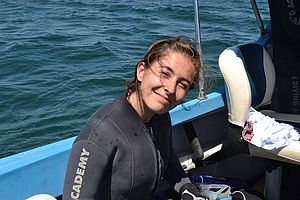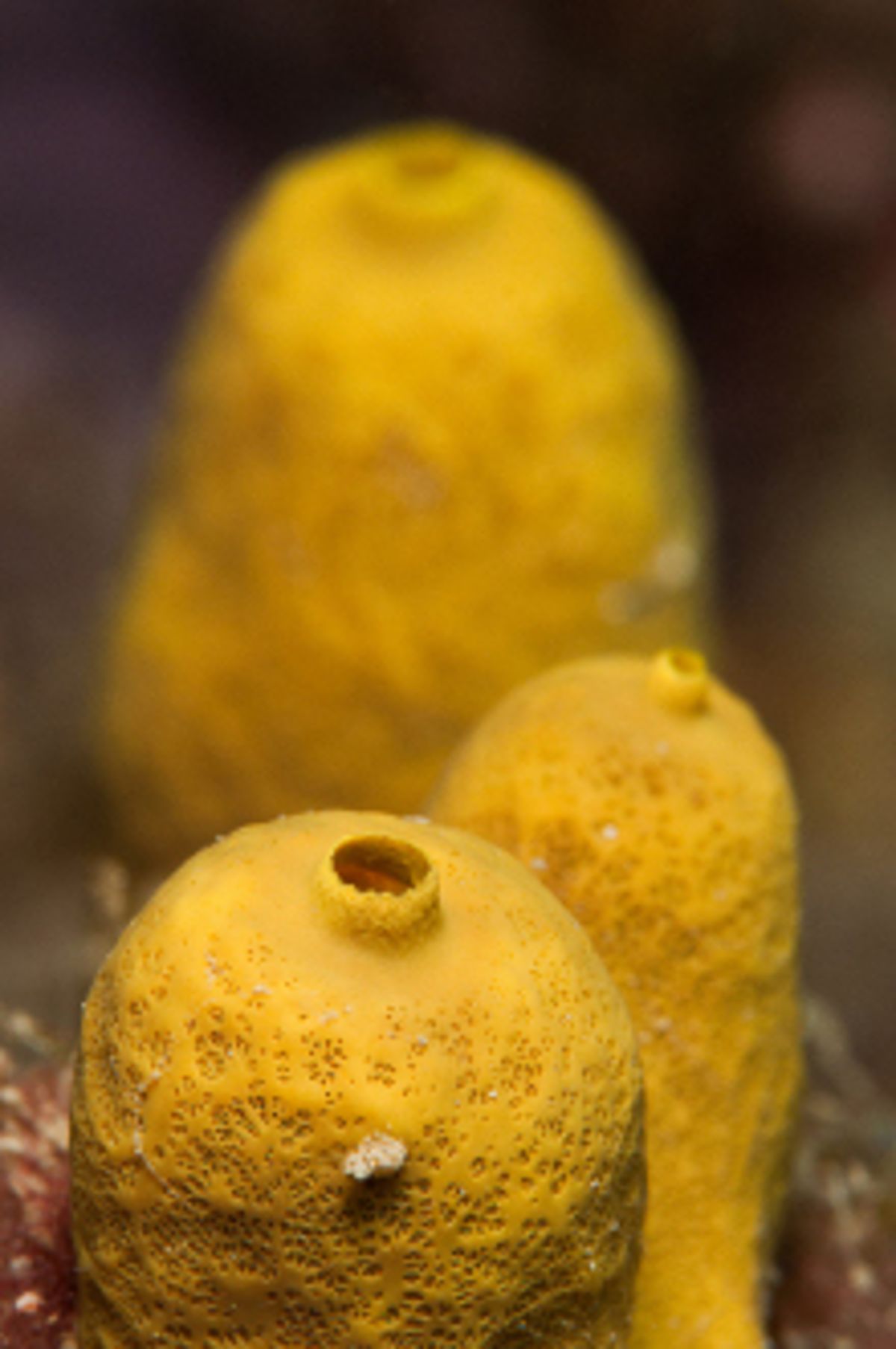Dr. Lucía Pita Galán

Research Division 3: Marine Ecology
Research Unit: Marine Symbioses
Düsternbrooker Weg 20
D-24105 Kiel
Room: DW-311
Phone: +49 431 600-4487
Fax: +49 431 600-4482
Email: lpita(at)geomar.de
Research interests
My research aim is to elucidate the mechanisms of homeostasis in animal-microbe symbiosis and how the association with microbes influences animal ecology, adaptation and evolution. My current project focuses on investigating host mechanisms of interaction with microbes in marine sponges, with particular focus on the immune system. This project is framed in the CRC1182-B1 project "Metaorganisms"
Keywords: microbial ecology; Immunology; RNA-seq; qPCR, aquarium experiments; sponge; species interaction; stress; population genetics

Academic positions and education
- march 2018-2021 Staff scientist at GEOMAR Kiel
- nov 2017-march2018 CRC1182 postdoctoral researcher, GEOMAR Kiel
- 2015-2017 Alexander von Humboldt postdoctoral fellow, GEOMAR Kiel
- 2014-2015 Postdoctoral researcher, University of Würzburg (Germany)
- 2014 PhD in Biodiversity, cum laude, University of Barcelona (Spain)
- 2010-2014 PhD student, University of Barcelona (Spain)
- 2010 MSc. Fundamental and Applied Ecology, University of Barcelona (Spain)
- 2009 BSc Biology, University of A Coruña (Spain)
- 2008 Erasmus student, European Institute for Marine Studies (IUEM), University Western Brittany (France)
As part of my academic education and collaborations, I had also the opportunity to visit other research institutions in France, Italy, USA and Spain.
Awards, fellowships and grants
- 2020 CRC1182 Young Investigator Award.
- 2019-2022 DFG sequencing project IMMUBASE -PIs: Dr. Lucía Pita; Prof. Dr. Reusch (GEOMAR) and Prof. Dr. Schmitz-Streit (CAU Kiel).
- 2015-2017 Alexander von Humboldt Foundation Award for Postdoctoral Researchers. Alexander von Humboldt Foundation, The Future Ocean Cluster of Excellence
- 2016 Future Ocean Cluster support fund.
- 2014 Systematics Research Fund. Linnean Society of London " Species delineation in the sponge genus Ircinia using multigene datasets". PI: Dr. Ana Riesgo and Dr. Lucía Pita
- 2011-2014 PhD Fellowship Research. Agency for Management of University and Research Grants (AGAUR, Catalan government)
- 2013 Travel scholarship to the 9th World Sponge Conference awarded by the Scientific Committee
- 2013 Research internship fellowship. AGAUR, Catalan Government. 3 month-research visit at the Institute of Marine and Environmental Technology, Baltimore MD (USA).
- 2009 Undergraduate research scholarship. Spanish Ministry of Education and Science. Department of Animal Biology, Plant Biology and Ecology at University of A Coruña (Spain)
- 2007-2008 ERAMUS scholarship. Erasmus program, Spanish Ministry of Education and Science, University of A Coruña, Bancaja bank
- 2005-2009 Scholarship for Bachelor studies, Spanish Ministry of Education and Science
Field work
My experience includes SCUBA diving (Catalan Coast, Spain); aquarium experiments (at the facilities in ICM-CSIC, Barcelona, Spain and in GEOMAR, Kiel, Germany); participation in oceanographic expeditions as a student (R/V Cornide de Saavedra, Vigo, Spain with University of Barcelona; R/V Marion Dufresne, Brest, France-Algeciras, Spain, with Université de Bretagne Occidentale-Institut Universitaire Européen de la Mer and Institute Polaire Français Paul Emile Victor).
For more information about my scientific activities and research profile, please visit My Website
Teaching
MNF-bioc-201 Advanced Studies in Biological Oceanography- Lecture
Time and place: Tue, Wed, Thu 12:15 - 13:00, DW20 - R.B54 [Lecture hall (westshore)]
from 6.4.2020 to 5.7.2020
MNF-bioc-332 Current Topics in Marine Ecology II
Time and place: Wed 14:30 - 17:00, DW20 - R.B55 [Seminar.R. (westshore)]
from 6.11.2019 to 17.2.2020
29.1.2020: Hentschel Humeida, U. & Pita, L.: Holobiont concept and disease
Selected Publications (full list at Google Scholar)
Jahn MT, Lachnit T, Markert SM, Stigloher C, Pita L, Ribes M, Dutilh BE & Hentschel U (2021) Lifestyle of sponge symbiont phages by host prediction and correlative microscopy. ISME J, doi.org/10.1038/s41396-021-00900-6
Wu, YC, García-Altares, M, Pintó, B, Ribes M, Hentschel U and Pita L (2020) Opisthobranch grazing results in mobilisation of spherulous cells and re-allocation of secondary metabolites in the sponge Aplysina aerophoba. Sci Rep 10, 21934, doi.org/10.1038/s41598-020-78667-7
Dierking K and Pita L (2020) Receptors mediating host-microbiota communication in the metaorganism: the Invertebrate perspective. Front. Immunol 11, 1251, https://doi.org/10.3389/fimmu.2020.01251
Sieber M, Pita L, Wiland-Bräuer N, Dirksen P, Wang J, Mortzfeld B, Franzenburg F, Schmitz RA, Baines JF, Fraune S, Henschel U, Schulenburg H, Bosch TCG, Traulsen A (2019) Neutrality in the Metaorganism. Plos Biology, 17 (6):e3000298
Pita L, Fraune S, Hentschel U (2016) Emerging sponge models of animal-microbe symbioses. Frontiers in Microbiology doi: 10.3389/fmicb.2016.02102
Riesgo A, Pérez-Portela R, Pita L, Blasco G, Erwin PM, López-Legentil S (2016) Population structure and connectivity in the Mediterranean sponge Ircinia fasciculata are affected by mass mortalities and hybridization. Heredity 117:427-439
Zhang F*, Pita L*, Erwin PM, Abaid S, López-Legentil S, Hill Russell T (2015) Symbiotic archaea in marine sponges show stability and host specificity in community structure and ammonia oxidation functionality. FEMS Microbiol Ecol 90(3):699-707. (*authors contributed equally to the study).
Pita L. (2014). Biogeography of sponge-associated bacterial communities and resilience to anthropogenic perturbations. PhD thesis. University of Barcelona.
Pita L, Erwin PM, Turon X & López-Legentil S (2013). Till death does us apart: Stable sponge-bacteria associations under thermal and food shortage stresses. PLoS One 8(11) e80307.
Pita L, Turon X, López-Legentil S & Erwin PM (2013) Host rules: spatial stability of bacterial communities associated with marine sponges (Ircinia spp) in the Western Mediterranean Sea. FEMS Microbiol Ecol 86:268-276
Pita L, López-Legentil S & Erwin PM (2013) Biogeography and host fidelity of bacterial communities in Ircinia spp from the Bahamas. Microb Ecol 66:437-447.
Erwin PM, Pita L, López-Legentil S & Turon X (2012) Stability of sponge-associated bacteria over large seasonal shifts in temperature and irradiance. Appl Environ Microbiol 78(20):7358-7368.
Calderón I, Pita L, Brusciotti S, Palacín C & Turon X. (2012) Time and space:genetic structure of the cohorts of the common sea urchin Paracentrotus lividus in Western Mediterranean. Mar Biol 159:187-197.


